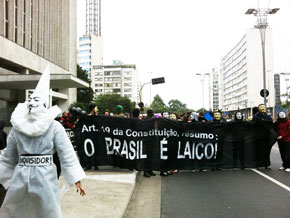The fulminant rise of religious fundamentalism in the public sphere and its growing influence on public policies constitute an attack on democracy.
We generally judge obscurantist Christian discourses as mere obsessions against LGBT or women's rights. Unfortunately, it is much more than that.
Neo-Pentecostal evangelicals have long consolidated themselves as an electoral and party force, mainly through their massive presence on television, occupying public concessions. Its reactionary agenda prioritizes imposing mandatory religious education on governments, vetoing policies promoting LGBT citizenship and also women's sexual and reproductive rights. They act without shyness, electing more and more councilors, state and federal deputies and senators.
Catholics, led by Ratzinger, have watched their church shift to the right incessantly for years. Today the hegemony at the top of the CNBB is that of hyper-conservative bishops. The prestige belongs to the heartthrob media priests, who imitate the methods of television pastors.
The 2010 electoral campaign opened a new period. Fundamentalist Christian influence gained ground and established itself as a kind of “conscience” of the State, especially the federal government.
The debate about women's right to decide about their own bodies was stigmatized and completely banned. The growing achievements that the LGBT movement had been consolidating were placed under fire.
In 2010, Serra adopted the most reactionary Christian ideology: he used and abused the issue of abortion. Dilma was held hostage by these sectors and made public commitments that, as we have seen clearly today, block the feminist and LGBT agenda.
Evangelical bench
And obscurantism shows its claws more, because it feels stronger. From the João Campos (PSDB-GO) bill, which aims to revoke the ban on therapies that aim to “cure gays”, to the attack on minister Gilberto Carvalho, who in a pathetic attitude found himself forced to ask for forgiveness from the evangelical bench – the resourcefulness of fundamentalism is growing.
Worthy of note is President Dilma's conservative position. In addition to not welcoming the LGBT movement and not attending the National Conference that discussed policies for the population, she vetoed propaganda from the Ministry of Health, which showed two young gays hugging each other. Not to mention the already well-known veto of the “School without Homophobia” project, which remains in the catacombs.
It is easy to stone the president – a natural and understandable reaction. More complex is reflecting on the “general state of the art” and articulating strategies to guarantee state secularity. After all, politics is a correlation of forces. An objective process.
2012 is the time to elect mayors and councilors. Homophobic religious people are already in the field blackmailing candidates and blocking LGBT rights.
It is us? Are we going to watch everything without doing anything?
Articulating a national movement – broad, rooted, plural – in defense of the SEcular STATE is the challenge posed. The discussion is non-partisan. Modernity or middle ages?
It's not just about LGBT rights. It is about democracy, pluralism, human rights. It is about the possibility of building a country that is, in fact, for everyone.
(Before it's too late).
*Julian Rodrigues is an activist with the Corsa group, Aliança Paulista LGBT and ABGLT


